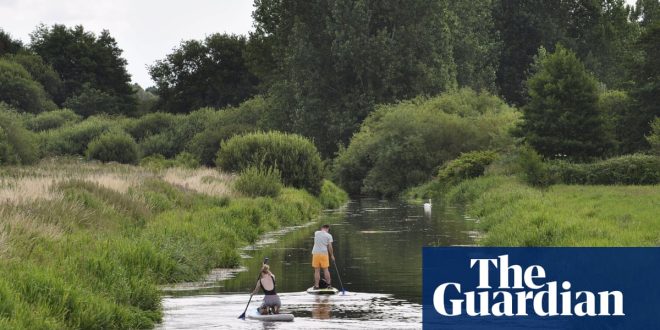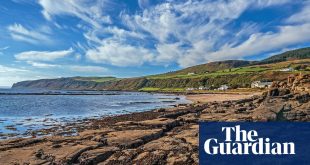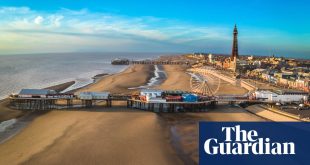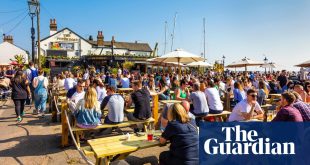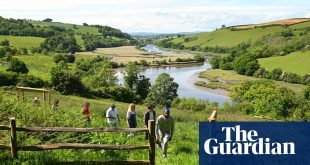There are 124 miles of lock-free, navigable waterways, ripe for boat exploration, in Norfolk and Suffolk’s Broads national park – Britain’s largest protected wetland. Sadly, a much larger four-figure number, in pounds sterling, was what kept popping up on my computer screen when I was searching for a suitable boat on which to spend a long weekend enjoying them.
Thankfully, I had a plan B – or rather, a plan SUP.
Standup paddleboarding used to be seen as little more than a fun way to pass an hour or two on holiday. But during the pandemic and lockdowns, sales of inflatable boards soared. Since then companies such as Devon-based manufacturer Red Equipment, iRocker and Aztron have launched a range of compact boards that, once deflated, fold to half the size, making them more transportable – and making longer adventures even easier.
Since I’d bought mine, a multi-day trip had been beckoning. So, after leaving work early on Friday, my partner and I jumped on a train to Norwich carrying our boards and minimal clothes for the weekend on our backs. From there it was a 30-minute (£2) bus ride to Coltishall – the “gateway to the Broads”. If you don’t have your own board they can be hired from GoPaddle in Horning from £40 a day, with discounts for longer periods.
We opted for affordable luxury for our first night, at the Norfolk Mead hotel, before our camping adventure. On the banks of the River Bure, this Georgian country house is also home to an award-winning restaurant where we ate Norfolk-caught sea bass, local cheeses and the regional speciality, crunch rolls (granary style, made from malted wheat grains).
We woke to sunny skies and, after breakfast, picked up our pre-ordered packed lunches before going to the hotel’s flower-lined water frontage. There we inflated the boards, packed and secured our bags, and set off.
Moss-like stonewort intermingled with streams of ribbongrass swished as we passed over it. Trees provided a tunnelled canopy, and we peered into the huge gardens of waterside houses as we glided by.
The Broads take up 0.1% of Britain, but they are home to a quarter of our country’s rarest species. Occasionally, we saw the electric blue flash of a kingfisher, but more common were azure damselflies and the rare Norfolk hawker dragonfly, hitching a lift on our rafts as we navigated between waterlilies.
We stopped for a snack at Belaugh, where boaters newly acquainted with their pleasure craft struggled to moor, while we slipped in effortlessly without a sound. Swans, cygnets, moorhens and grebes came to seek shelter between our boards – we had been accepted as fellow water-dwellers.
It was Saturday, yet on leaving Belaugh we had seen only three boats as we twisted through narrow channels of willow and alder, the lapping sound from the dip of our paddles almost hypnotic. As we grew close to Wroxham – the “capital of the Broads” – more paddleboards, pedal boats and canoes joined in what felt like an unofficial motor-free flotilla. At the riverside park we sat with our feet in the water, eating sandwiches and chatting about our route to those curious about our oversized packs.
As we paddled away, the scent of food being cooked at the town’s riverside pubs and cafes faded and the waterway widened. At times it felt as though we were alone in a riverine wilderness; at others, it was as though we’d stumbled upon a superhighway of boaters.
We stopped to give our arms a rest at Hoveton Great Broad nature trail – a walking circuit on an island at the broad of the same name, accessible only by water. In the half-hour we strolled there we spotted caterpillars and frogs, attempted to photograph red admiral butterflies and learned, courtesy of the wardens, about the practice of bio-manipulation. Fish are being kept out once they leave the broad naturally, to allow water fleas (which eat algae and thus clean the water) to bounce back in numbers, which will allow plants to grow and mean more fish.
The sun was starting to set as we paddled into Salhouse Broad and our campsite. It was just a simple field with some composting toilets, but we had splurged £28 on a camping pod, to avoid carrying a tent – a shrewd move, as rain began to fall within minutes of our arrival.
after newsletter promotion
That night we walked 20 minutes to the Fur and Feather Inn, where “beer travels metres, not miles” from the onsite brewery. We sat outside admiring the thatched roof, sampling “wherry” amber ale (named after the large wooden sailing barges popular in the 1600s for transporting cargo, now used as luxury day-tripping vessels) before heading indoors to eat bangers and mash.
We woke at dawn to a chorus of blackbird, chiffchaff and Canada geese as we packed our bags and hauled the boards back in the water – on a mission to get breakfast. A low-hanging mist wafted over the water as we went north, passing the edge of Bure marshes to arrive at Horning and a large coffee at the Staithe’n’Willow.
There is something magical about being on the water early on a Sunday before motorboaters start their engines. We took advantage of the perfect conditions to start tackling the seven-mile paddle to the station at Acle.
Before long, the bankside trees thinned, revealing windmills in various states of restoration. Almost on cue, the wind picked up, turning paddling into a workout. We took a break at the 11th-century remains of St Benet’s Abbey, outside Ludham, before knuckling down to join the confluence with the River Thurne and turning south.
Thanks to the rising wind, we went ashore a little early at Acle Bridge, where the pub of the same name welcomed muddy boots (and boards), rewarding our efforts with chips and a pot of tea. Then we deflated the boards, rolled them back into the bags and speed-walked to the station.
As the train rocked us into a happily exhausted lull, I checked our receipts. We may not have paddled the full 124 miles, but we had enjoyed what felt like a real adventure – and one that had been remarkably inexpensive.
The trip was supported by Visit Norwich. Rail travel was provided by LNER. Doubles at the Norfolk Mead hotel cost from £145 B&B. Salhouse Broad offers camping from £15 (for up to four people), and a camping pod for £28 a night. More info from visitthebroads.co.uk. Paddleboarders on the Broads require a licence. When hiring a board the licence is part of the package
 Top Naija News – Nigeria News, Nigerian News & Top Stories Top Naija News – Nigerian Newspapers, Nigerian News. topnaijanews is a daily Nigerian newspaper covering Latest News, Breaking News, Entertainment, Sports, Lifestyle and Politics.
Top Naija News – Nigeria News, Nigerian News & Top Stories Top Naija News – Nigerian Newspapers, Nigerian News. topnaijanews is a daily Nigerian newspaper covering Latest News, Breaking News, Entertainment, Sports, Lifestyle and Politics.
